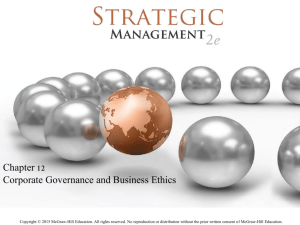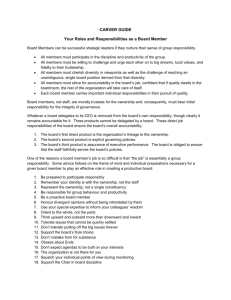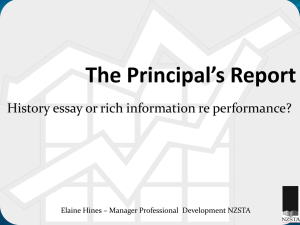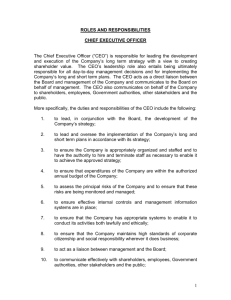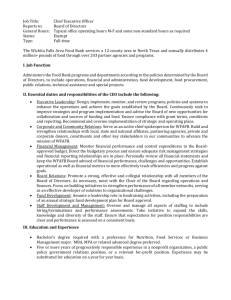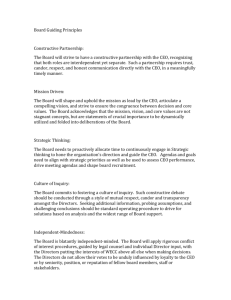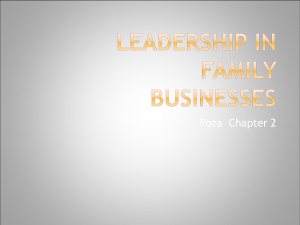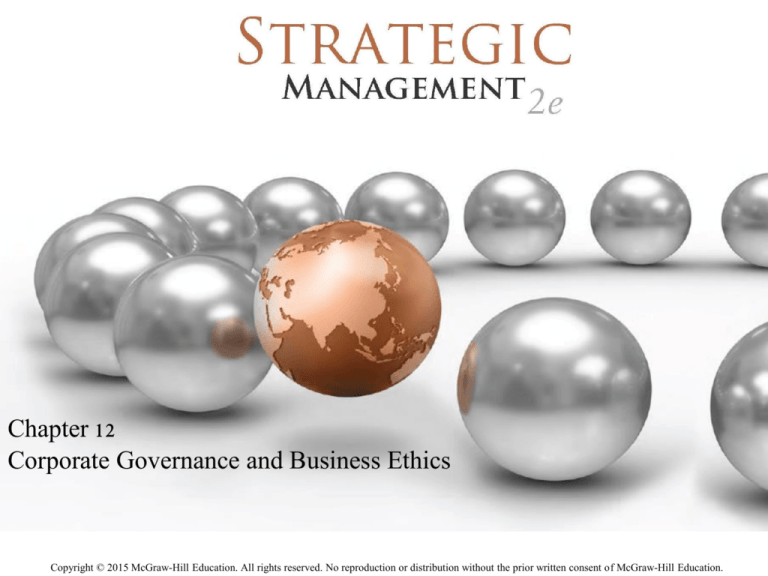
Chapter 12
Corporate Governance and Business Ethics
Copyright © 2015 McGraw-Hill Education. All rights reserved. No reproduction or distribution without the prior written consent of McGraw-Hill Education.
12-2
Chapter Outline
12.1 The Shared Value Framework
12.2 Corporate Governance
• Agency Theory
• The Board of Directors
• Other Governance Mechanisms
12.3 Strategy and Business Ethics
12.4 Implications for the Strategist
12-3
ChapterCase 12
©ChinaFotoPress via Getty Images
HP’s Boardroom Soap Opera Continues
$120 billion in sales
• “The HP Way” – an admired corporate culture (1938)
Mark Hurd became CEO in 2005.
• Good financial results – lower costs & higher sales
18-month period, HP’s market value dropped 80%
• $105 billion (April ‘10) to $23 billion (November ‘12)
Leo Apotheker became CEO in Fall 2010.
Meg Whitman became CEO in Fall 2011.
12-4
ChapterCase 12
HP’s Boardroom Soap Opera Continues
2006 First Stage – HP-initiated unethical surveillance
to uncover a suspected leak.
2010 (summer) Second Stage – Jodie Fisher, a former
adult-movie actress, filed a lawsuit against CEO Mark
Hurd.
2010 (fall) Third Stage – (new) CEO Leo Apotheker
overpaid for British software company Autonomy
($11B).
• HP took nearly $9 billion write-down for this within a year!
12-5
Strategy Smart Videos
Governance Gone Wrong – The Case of Tyco
https://www.youtube.com/watch?v=8rcxO6urHTE/
4:29 Minutes
Dennis Kozlowski on 60 Minutes
12-6
12.1 The Shared Value Framework
Guidance to managers on competitive
advantage, balancing Agency & Shareholder
perspectives
• Economic imperative
• Corporate social responsibility
introduced in Ch. 1
Creates a larger pie
• Benefits shareholders and other stakeholders
12-7
Public Stock Companies and
Shareholder Capitalism
Public stock companies are vital in free market
economies.
Four attractive characteristics of public firms:
1)
2)
3)
4)
Limited liability for investors
Transferability of investor interest
Legal personality
Separation of ownership and control
12-8
MILTON FRIEDMAN VS. MICHAEL PORTER/ARCHIE CARROLL
Traditional View: (Friedman)
• Shareholder capitalism: shareholders – the providers of the
necessary risk capital and the legal owners of public companies
– have the most legitimate claim on profits. Argues that
managers are obligated to maximize returns to stockholders as
the legitimate owners of the firm.
Shared Value View: (Porter/Carroll)
• Corporate social responsibility (CSR): obligations extend
beyond the economic responsibility to stockholders and include
legal, ethical, and philanthropic obligations to other stakeholder
groups and society as a whole.
12-9
CSR of Business
10
12.2 Corporate Governance
AGENCY THEORY
• A theory that views the firm as a nexus of legal contracts
BOARD OF DIRECTORS
• The centerpiece of corporate governance, composed of inside
and outside directors who are elected by the shareholders
OTHER GOVERANCE MECHANISMS
• Executive compensation
• The market for corporate control
• Financial statement auditors, government regulators, and
industry analysis
12-11
Exhibit 12.5 Principal-Agent Problem
12-12
Corporate Governance (cont’d)
Agency Theory
• Views a firm as a nexus of legal contracts
Relationships among shareholders, managers, and hierarchies.
Front-line employees have an advantage over management.
Firms need to design work tasks.
Adverse Selection
• Misrepresentation of a job
Beyond his/her ability to do things
Moral Hazard
• Difficulty to ascertain whether the agent gives his/her best
12-13
The Board of Directors
Centerpiece of corporate governance
• Primary responsibility to “monitor & control” actions of
CEO & TMT – Legal obligation
Different shareholder goals
• Institutional investors
• Individual short-term investors
Inside directors
• Generally part of the company’s senior management team
Outside directors –
• Not employees of the firm, but not always “outsiders”
Senior executives from other firms or full-time professionals
12-14
Strategy Highlight 12.1
GE’s Board of Directors
16/17 members are independent outside directors
Comprised of business, academia, & government
CEO Duality – Jeffrey Immelt, the one inside director,
is both the CEO and chairperson of the board, a
declining practice due to the conflict of interest
GE’s board has 5 committees.
Boardroom diversity (28% for GE) in backgrounds and
expertise is considered an asset: More diverse boards
are less likely to fall victim to groupthink.
12-15
EXECUTIVE COMPENSATION
Interest aligned through “monitoring & control and/or
compensation (Stewardship Theory)
Salary, bonus, perks, and stock issuance/options
(long-term incentives)
CEO pay - two issues:
1. CEO pay compared to average employee pay
•
•
U.S. ratio 2012: 300 to 1, 1980: 40 to 1
Average CEO pay in Fortune 500 firm: $11.7 million
2. Firm performance and CEO pay
•
•
•
McKesson high salary but also high performance
Home Depot, HP….NOT
Why do CEOs make so much?
12-16
Other Governance Mechanisms
The market for corporate control
• External governance mechanism
• Hostile takeover
• Corporate raiders and hedge funds
2013−Dell’s LBO was a target of Carl Icahn.
Auditors, government regulators, and
industry analysts
• SEC−GAAP as reported publicly via EDGAR
• The Wall Street Journal, Bloomberg Businessweek,
Forbes…
• GovernanceMetrics International (GMI Ratings)
12-17
12.3 Strategy and Business Ethics
Business ethics
• Agreed-upon explicit code of conduct in business
Legal conduct vs. Ethical conduct
• Legal (min acceptable standard), but may not be ethical
Mortgage brokers selling “option ARMs”
• Ethical, but may not be legal
Pharmaceutical firms discussing pricing to increase affordability
When facing an ethical dilemma:
• Do the actions fall into acceptable norms of professional
behavior?
• Does it feel comfortable explaining and defending the
decision in public?
12-18
Strategy Highlight 12.2
Did Goldman Sachs and the “Fabulous Fab” Commit
Securities Fraud?
The SEC alleged that Goldman violated its fiduciary
responsibility and defrauded its clients.
Collateralized Debt Obligation (CDO) such as Abacus
• Roll-up of risky investments into a AAA-rated CDO
Rating agencies falsely viewed these as safe investments!
Goldman Sachs settled by paying a $550 million
• Did not admit any wrongdoing
• Mr. Tourre convicted of securities fraud in Aug. 2013
12-19
12.4 Implications for the Strategist
Effective corporate governance and business ethics
• Critical to gaining and sustaining competitive advantage
Strategic leaders need to take actions with integrity.
IBM emphasizes its values across the globe.
• Example of an employee falling ill at a training session
• An expectation among IBMers- a “lived” value
Glaring ethical lapses in the last 10 years call for:
• Consistent International ethical values & code of conduct
• Professionalization of management
12-20
ChapterCase 12
©ChinaFotoPress via Getty Images
Consider This…
• HP featured in the bestseller Built to Last (1994)
Much has changed since Mr. Hewlett’s death in 2001.
• HP board’s decisions destroyed $82 billion in
shareholder value.
groupthink in rallying around Mr. Apotheker as CEO
Full board never met him before hiring him.
flawed due diligence process in the Autonomy acquisition
Lack of an open search to appoint Meg Whitman as CEO
12-21


